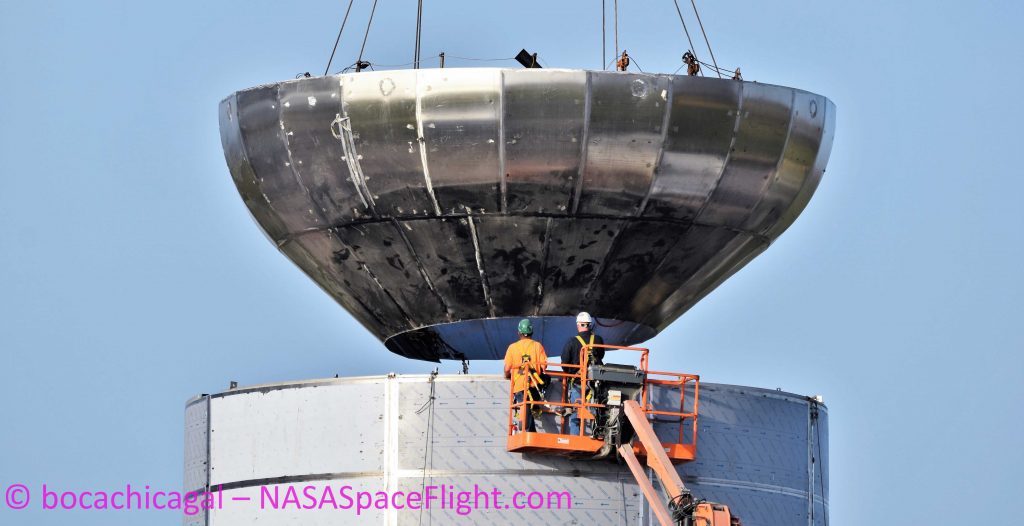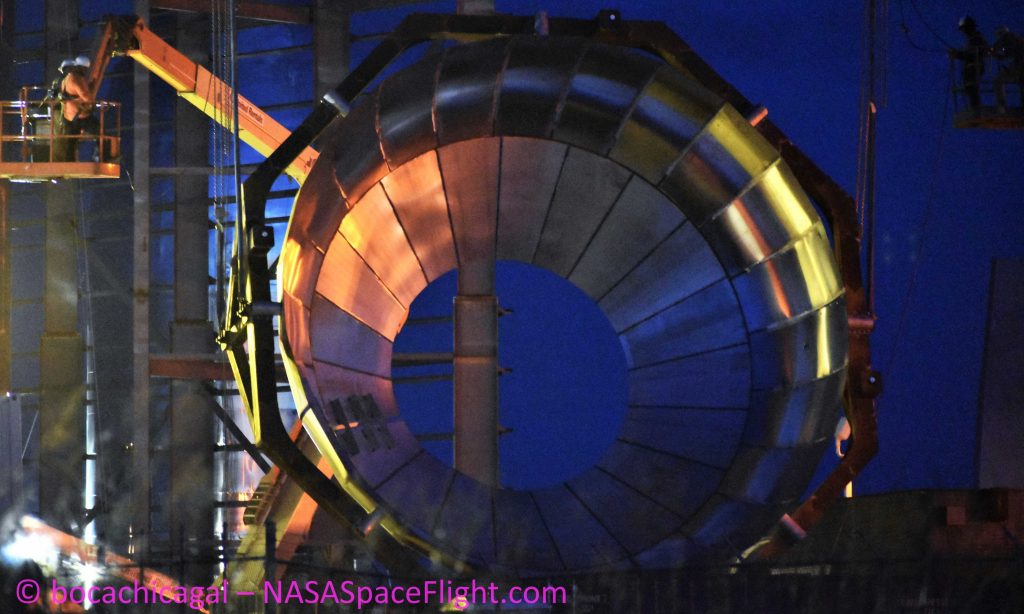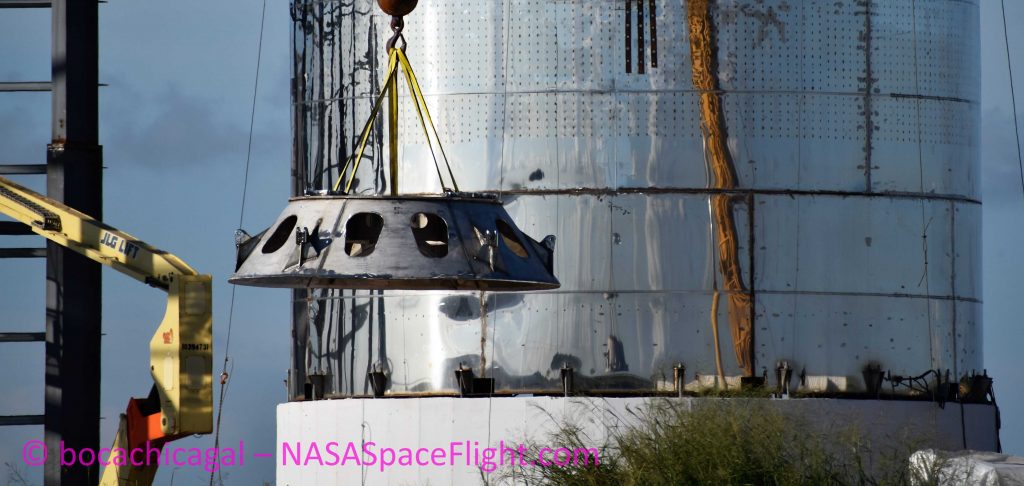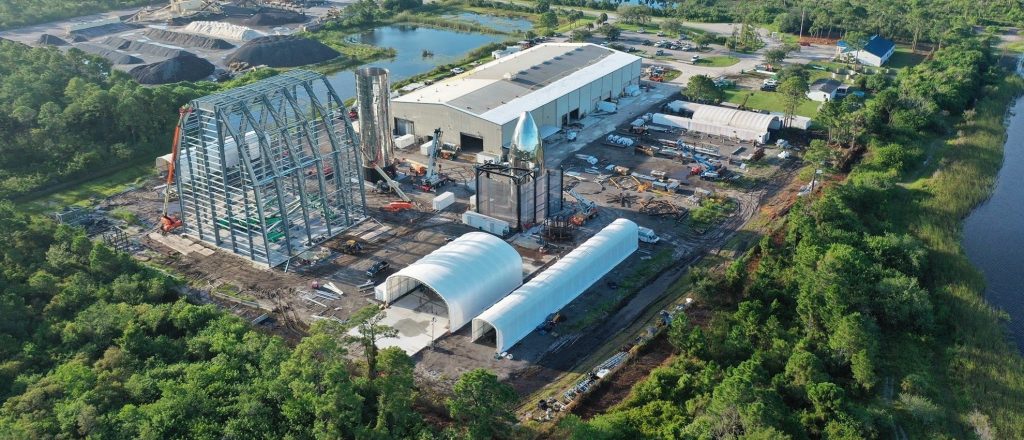In the last week alone, SpaceX’s twin orbital Starship prototypes have made some truly jaw-dropping progress. Onlookers have witnessed Florida’s Starship push through a rapid growth spurt, while the company’s Texas team has begun to install propellant tank bulkheads and work on a triple-Raptor thrust structure.
Meanwhile, SpaceX CEO Elon Musk has suggested that one or both of the orbital-class Starship prototypes could be “almost ready to fly” by August 24th, the date of the CEO’s next official update on Starship (formerly BFR and ITS). Although the actual challenge of building a massive, orbital-class launch vehicle is far subtler than the visible steelwork needed to build its primary structure and pressure vessels, the veritable leaps forward made in both Texas and Florida in the last 7-10 days are extremely encouraging signs.
Bulkheads galore
Starting off in Boca Chica, Texas, SpaceX’s team of engineers and technicians have been simultaneously handling Starhopper’s first untethered flight test (completed on July 25th) and building the facility’s orbital-class Starship prototype. Most significantly, after a few days of preparation, what is likely the Texas Starship’s first bulkhead was lowered inside its ~25m-tall (80 ft) barrel section, composed of the spacecraft’s propulsion section and propellant tanks.
Pictured below, technicians carefully craned the first 9m (30ft) diameter dome inside the Texas Starship on July 30th. Based on its orientation and the recent arrival of a similar dome, this particular bulkhead is almost certainly the bottom dome and first of three to be installed. It will thus serve as the bottom of the Texas Starship’s liquid methane propellant tank, as well as a significant structural member of the rocket’s thrust structure, needed to safely transfer the force of 3-6 Raptors to the rest of Starship.


SpaceX Texas also accepted delivery of the first multi-engine Starship thrust structure, featuring three obvious spots for three Raptors, meshing with Musk’s August 3rd statement that “Starship Mk1” would feature three of the engines.

11 meters, 5 days
Meanwhile, at SpaceX’s similar Florida Starship facility, the similar-but-not-quite-identical spacecraft has experienced even more rapid growth. Over the course of perhaps 4 or 5 days, technicians installed a full six new rings worth of steel segments on the vehicle’s tank section, separated from the curved nose section just like SpaceX’s Texas Starship. With an individual height of almost exactly six feet (~1.8m), the six new rings combined to add more than 10.5m to the Florida Starship’s relative height in just a few days. Combined, the nose and barrel sections would likely reach a height of 45-50m (145-165 ft), roughly 10-15% shy of full height (55m).
No fewer than 7 additional rings are visible in various stages of work (c. Aug. 4) across the Cocoa campus after the recent growth spurt.

Of note, a bulkhead visible between the Florida Starship’s barrel and nose sections in mid-July disappeared around the third week of the month, a strong indicator that SpaceX’s Florida campus actually beat Texas to their first Starship tank dome installation by as much as ~10 days. The fact that SpaceX is effectively racing itself to build the first flight-ready orbital-class Starship is deeply entertaining, but it also serves as an extremely unique example of the application of A/B testing (commonly used in software dev.) to spacecraft assembly.
Per Musk, the goal is not meant to be cutthroat (i.e. two groups enter, one group leaves) and both groups (Boca Chica and Cocoa) were said to be actively cooperating and sharing important lessons learned. Still, the geographically separated groups are visibly utilizing different methods, facilities, materials, and approaches. In effect, SpaceX has encouraged two of its own groups to duel (albeit in a semi-friendly manner) as a deeply unorthodox method of getting Starship to operational readiness as fast as physically possible.
Although Musk did partially contradict himself on August 3rd, implying that the first orbital Starship prototype(s) could be “almost ready for flight” by late August, the SpaceX CEO stated on July 19th that both Florida and Texas Starships could be ready for their first (suborbital) flights in “2 to 3 months”, or September/October. The first orbital Starship launch would follow as few as 2-3 months after that (or those) first flight milestones.
In short, Musk’s official August 24th Starship presentation is likely to be downright jaw-dropping. Stay tuned!
Check out Teslarati’s newsletters for prompt updates, on-the-ground perspectives, and unique glimpses of SpaceX’s rocket launch and recovery processes.

https://www.teslarati.com/spacex-texas-florida-orbital-starships-rapid-progress/
2019-08-05 10:46:17Z
52780344707229
Tidak ada komentar:
Posting Komentar